Will Trump Democrats play a role in the 2016 presidential race?
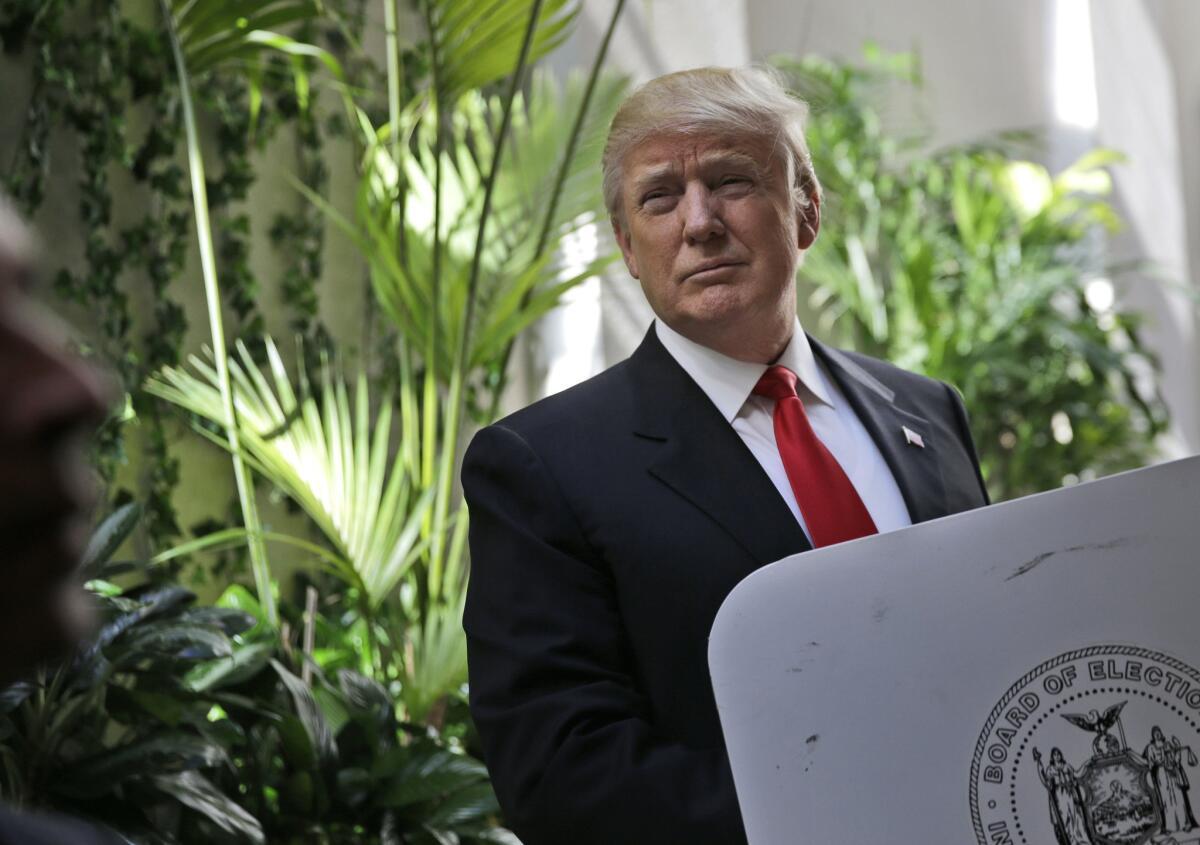
Republican presidential candidate Donald Trump votes in the New York primary April 19. The Anaheim City Council will consider denouncing Trumpâs rhetoric.
A retired middle school principal was so moved by Donald Trump that he switched his Democratic Party registration so he can vote for the Republican billionaire in next Tuesdayâs Pennsylvania primary.
So did the daughter of a steel worker, who twice voted for President Obama but says she is âoverâ the Democrats' political correctness.
And a husband-wife team of Trump volunteers â sheâs a laid-off airport worker, heâs a laid-off truck driver -- were Democrats for 30 years, until recently.
âWe always voted Democrat,â said Laurie McGinnis, 49, as her husband, Ricky, 57, hung a Trump banner outside their South Greensburg home. âBut not any more.â
Some of these newly minted Pennsylvania Republicans are simply formalizing a process that began with Ronald Reaganâs election in 1980, when conservative-leaning Democrats began shifting away from the party in this faded industrial Rust Belt.
Others moved abruptly, inspired by Trump and fed up with a party they say no longer speaks their language.
Together the result is one of the most sizable shifts of partisan allegiance ever seen in Pennsylvania: 61,500 Democrats have become Republicans so far this year, part of a 145,000 jump in Republican registrations since the fall 2015 election, according to state figures analyzed by both parties. Itâs more new Republicans than in the previous four years combined.
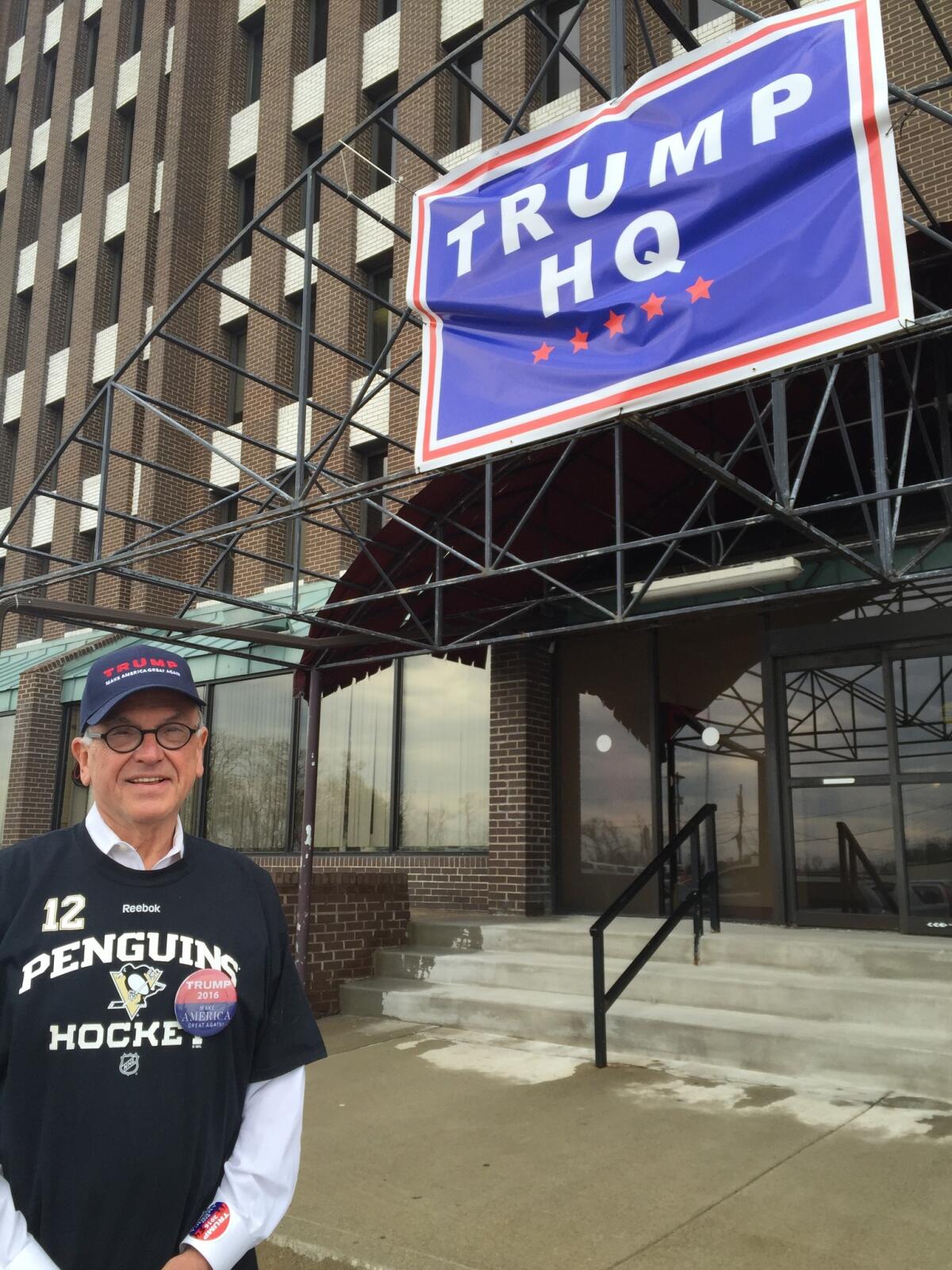
The onslaught has helped make Trump the favorite heading into Tuesdayâs primary, chipping away at the Democratic stronghold and helping put Pennsylvania, which voted for Obama twice, in play in the November presidential election.
âThe party-switching has been going on in an evolutionary way for two decades. This just propelled it faster,â said G. Terry Madonna, a professor at Franklin and Marshall University in Lancaster, Pa. âMany of them are Reagan Democrats â white, working-class, blue-collar, incomes of $35,000 to $40,000 or less, high school educations or less."
âThey feel frustrated, they feel left behind,â Madonna said. âThey feel Trump is sticking it to the man.â
East of urban Pittsburgh, at Trump headquarters in Monroeville, volunteer Tricia Cunningham said that half the people who walk through the door are party switchers. So many supporters have come in to pick up lawn signs or volunteer that the office has had to open a second floor, and signs are limited to just one per person, Cunningham said.
Even her mom, a lifelong Democrat now living in a nearby nursing home, made the change, she said.
âI look in the mirror and I say, 'What the hell are you doing?'â chuckled Rox Serrao, the former principal, who voted for Obama in 2008 and had kept his party affiliation so he could back Democrats in local elections even though he was once a Republican. He went to the county courthouse last month to switch to the GOP. He now drives 40 miles daily to volunteer at the Trump office.
âItâs like a sense of belonging,â said Serrao, 68. âThatâs the problem with the whole thing: I donât think anybody thinks anybody cares about them any more.â
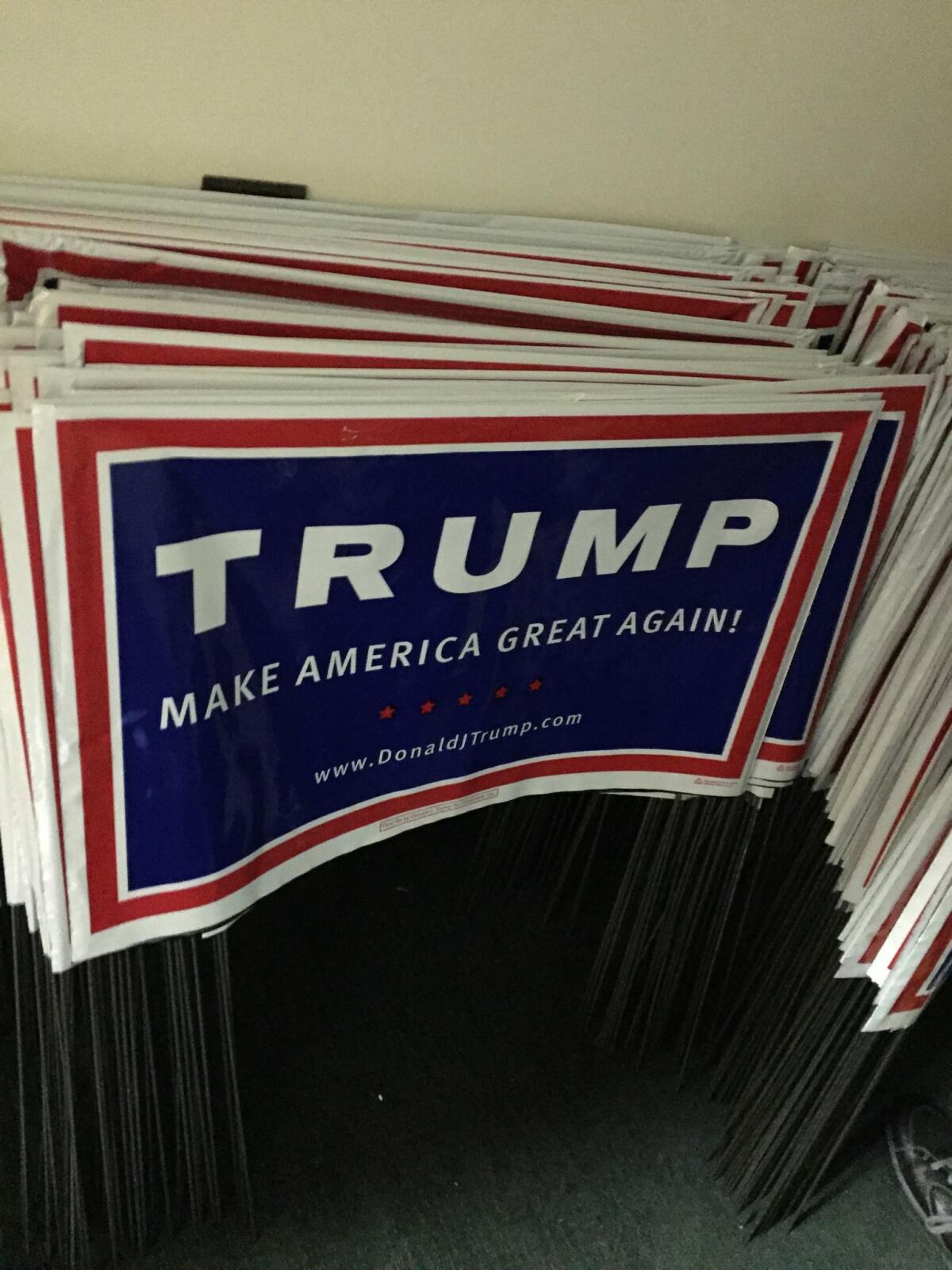
In some ways, itâs no great political mystery what has happened in Pennsylvania, where the hulking remains of the long-gone steel industry rust the landscape and coal country fights for its life. A billboard from the highway warns that solar and wind power arenât reliable enough energy sources to take its place.
The mostly white electorate here comes from an earlier iteration of the American melting pot â Eastern Europeans, Italians, Irish â who have little resemblance to the newer Democratic coalition of young people, minorities and urban white-collar professionals. Many families have stayed here for generations, as the nationâs economy and demographic trends have moved on.
"We voted Democrat for 59 years," said Eleanor Kanick, a retired Postmaster, with her husband Stanley, a welder, in Avonmore. "Our parents were Democrats, too. I said they're going to turn over in their graves."
Tom Balya, a former Democratic County Commissioner in Westmoreland who now hosts a local radio show, said callers often voice fears about shifting socio-economic conditions that have left them struggling to keep up. Itâs going take a generation for Democrats to recoup their losses, he said.
âThey see this world changing around them,â he said. âItâs a generational thing. Youâre not going to get people over 50 to change their beliefs. Itâs not going to change quickly."
But others see a deeper disconnect in a Democratic Party that has put its emphasis on attracting moneyed metropolitan voters and fast-growing minority groups while taking its core blue-collar electorate for granted, a theory spelled out by author Thomas Frank in his new book, âListen, Liberal.â
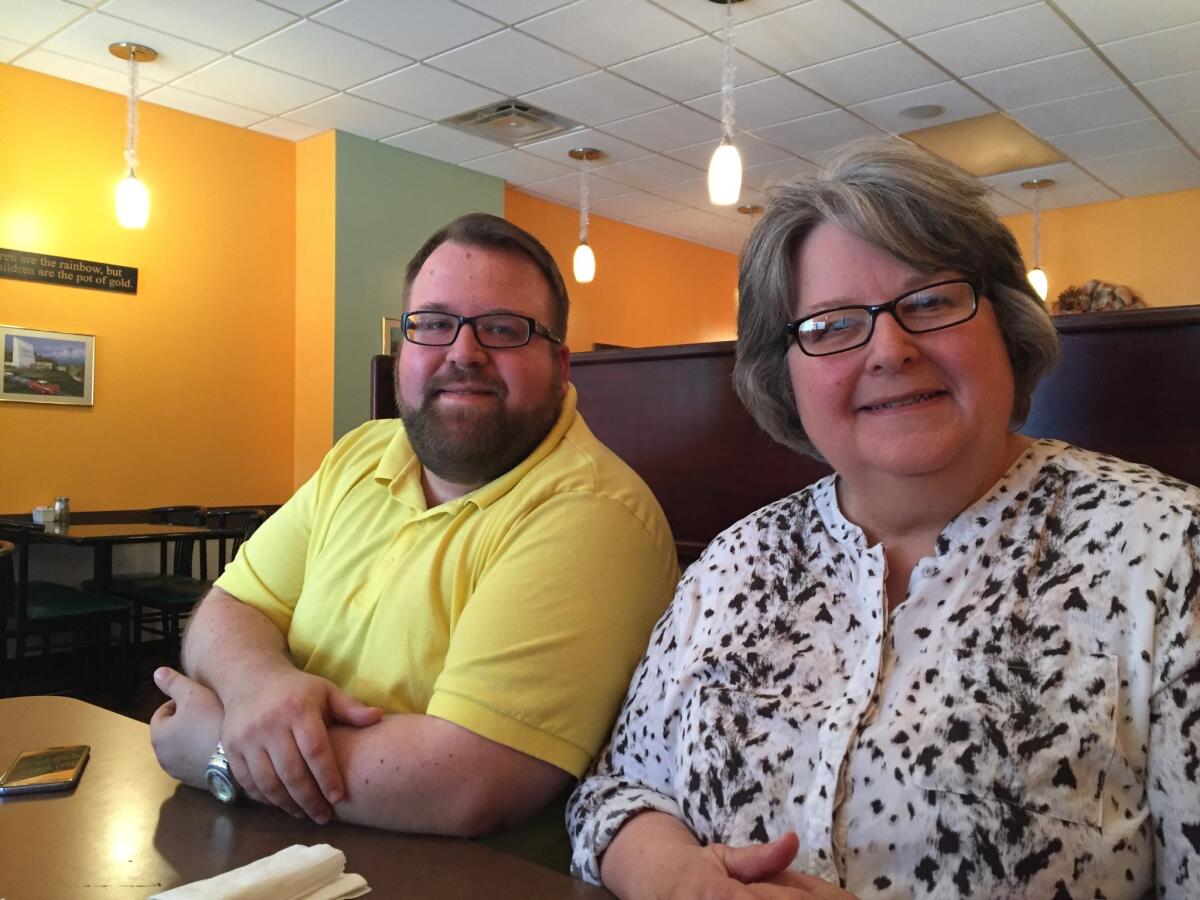
I would say the Democratic Party moved away from me. I didnt move away from it.
â Dorothy 'Sissy' Aukscunas
Dorothy "Sissy" Aukscunas grew up not far from where she lives now in Beaver, a rusty Gilded Age town of stately mansions and endless rail lines along the riverfront. Her dad, a Serbian immigrant, worked as foreman at a steel mill, the kind of job that enabled his wife to stay home and raise four children.
During the 2008 Democratic primary, she gathered her own young granddaughter to watch history unfold on TV, and cried when Hillary Clinton lost to Obama.
Over a cup of chunky beef soup at a coffee shop downtown with her 33-year-old son Micah â who also switched from Democrat to Republican -- she explained sheâs tired of the party championing âpolitically correctâ issues, like who should bake a cake for a gay wedding or whether to say "Happy Holidays" instead of "Merry Christmas," at a time when terrorism is intensifying and families are struggling to live on wages that havenât budged from what her husband earned 30 years ago.
âI would say the Democratic Party moved away from me,â she said. âI didnât move away from it.â
The more she watched Clinton this time, the less she liked, sensing an opportunist politician moving too far to the left to keep pace with the popularity of rival Bernie Sanders.
âOne of the main things I noticed was how intolerant tolerant people had become,â she said. âI noticed it in me as well â kind of judgey, hmm?â
It was a difficult decision to switch, she said, but when her driverâs license came due last fall, she was at the motor vehicle office when she checked the box.
Her grandchildren, who align more with Sanders, have not been pleased.
âI had to go from being a cool Mimi to now Iâm a fogey,â she resigned. âIâm OK with it.â
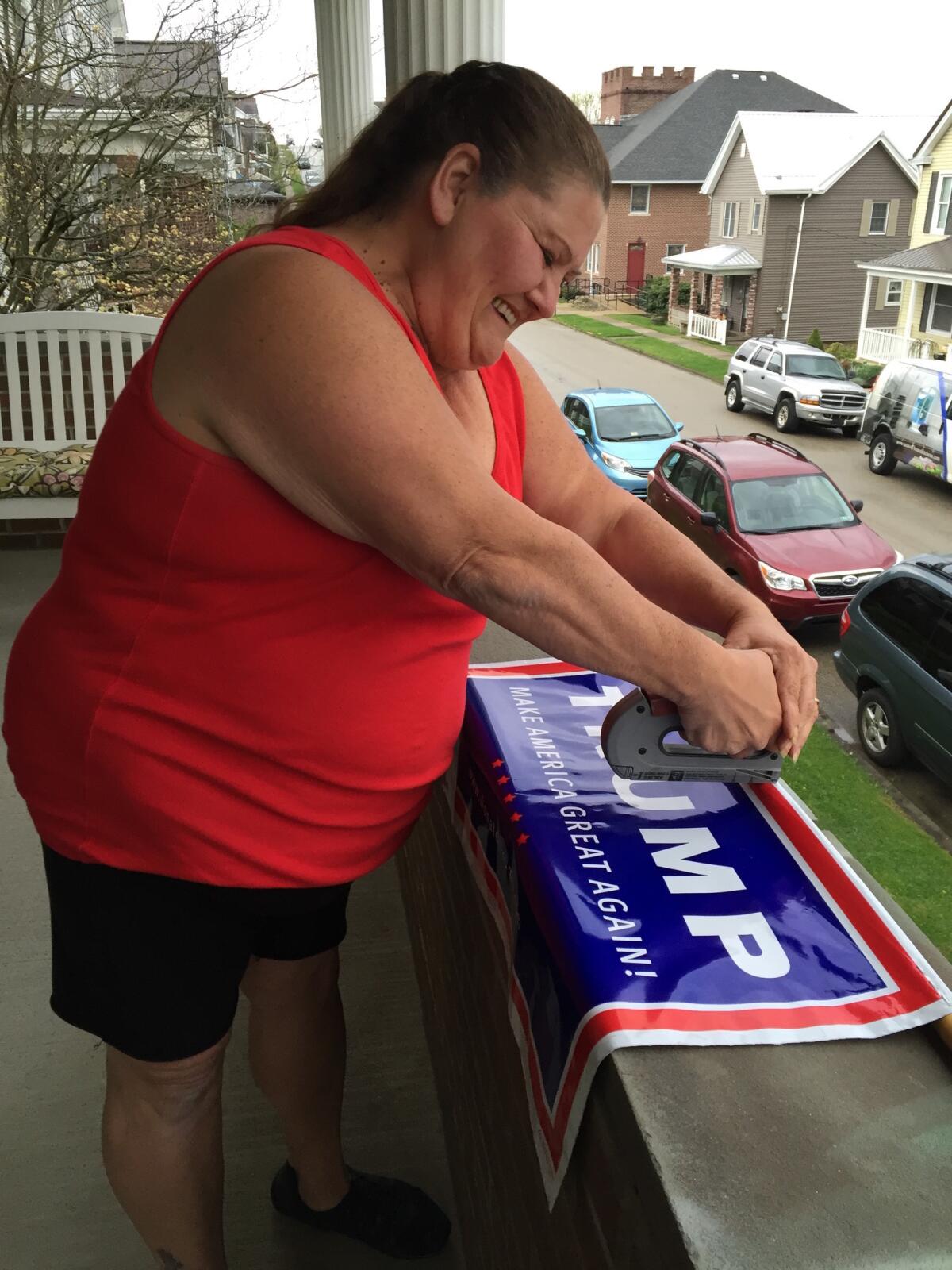
Democrats downplay the shift as notable but insignificant. When matched with 89,000 new Democrats registered since fall, the overall boost was 56,000 new Republicans in a state with more than 8 million voters. Democrats still hold a more than 900,000-voter advantage over the GOP in Pennsylvania.
âIt fits nicely with the narrative that Trumpâs going to bring out this whole cadre of voters ⌠and bring in states like Pennsylvania and the Rust Belt that havenât been in play for a while,â said Democratic Party spokesman Preston Maddock. âIâll believe it when I see it.â
At the same time, Republican officials are not necessarily doing backflips over the registration surge. They are very much aware that enthusiasm is more a vote for Trump than an affirmation of the GOP. The state's closed primary system forces voters to choose a party or sit out Tuesday's contests.
The GOP knows its hold on these voters is tenuous.
âBoth parties have lost track of how to reach out to middle-class voters,â said Michael T. Korns, Republican Party chairman in Westmoreland County, the next county over from Trumpâs headquarters. âI donât think anyone has been talking directly to voters in Westmoreland County. What weâve been getting for a long time is basically ignored.â
Laurie McGinnis, 49, and her husband, Ricky, 57, who grew up in the area and met as school bus drivers, were watching the first Republican debate last summer when they began thinking about switching.
âWe were just sitting there with our mouths open, in awe,â said McGinnis, who, like her husband, now collects disability benefits after both were laid off.
They were impressed by Trumpâs willingness to talk critically about immigrants and others in a way that other politicians wouldnât dare. âThe silent majorityâs been kept quiet by all the political correctness in the world,â she said, reading from some notes she had jotted in a notebook to organize her thoughts.
Even though thieves stole their Trump yard sign, she was stapling a new one to a flagpole Friday evening. Ricky hung it outside their tidy home, as the 4-year-old granddaughter they are raising looked on.
âI donât care how many signs they steal," she said. "Itâs not going to change the voters.
For the latest from Congress and the 2016 campaign, follow @LisaMascaro.
Sign up for Essential California
The most important California stories and recommendations in your inbox every morning.
You may occasionally receive promotional content from the Los Angeles Times.








